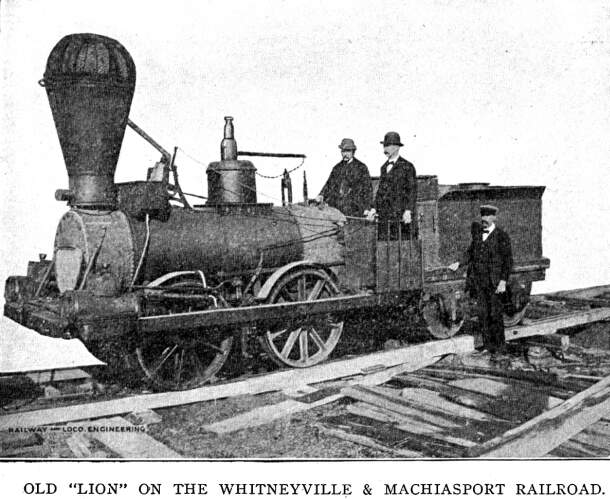|
||||||
  
 | ||||||
|
Railway and Locomotive Engineering — November, 1907 Old "Lion" of the W. & M. Railroad.
Editor: The recent dismantling of the Whitneyville and Machiasport Railroad, built in 1841, seems to call for something more than a passing notice. This road was among the first constructed in the Maine, except possibly the Oldtown and Veasie road in Penobscot County, which was built about the same time. The first successful trial at railroading with locomotives in the United States took place in 1829 with one of three locomotives imported from England. At the close of 1830 there were but forty miles of road completed in this country, and at the close of 1841, which was the year of the completion of the Whitneyville & Machiasport road, there were but 3,331 miles in all in the United States. The "Phenix" was the first engine which ran over this road, was of English make, and was sent by Hinkley & Drury, of Boston, to perform the work, while the "Tiger," one of the engines recently shipped to Portland, was being built by them. This engine was completed and sent by schooner to Machiasport in 1842. The "Lion," a companion engine, was also built by Hinkley & Drury. This locomotive was commenced in 1842 and completed in 1843. Only one of these engines was used at the time on this road, except for grading purposes or to make up trains. When this road was new the return trip from Machiasport with a "light train" was frequently made in from 15 to 20 minutes. The road was 7 and seven-eighths miles in length, with wooden stringers covered with strap iron, and this speed may be considered remarkable under the conditions. There were ten single saws, six lath machines and a shingle and clapboard machine running day and night on the dam at Whitneyville at that time, and eight train loads of lumber were manufactured each twenty-four hours. This road was in active use for more than fifty years, lumber and freight being conveyed by rail until 1892, at which time it became so much out of repair that a train could not be run on the rails moving at a rate much faster than a walk. The reason for the abandonment was that the falling off in the cut of lumber made the effort to provide for natural decay a losing game. From the start to finish the road was free to anybody who chose to ride upon it and take his own risk, and the accommodating engineer would always slow down or, for a lady or an old man he would come to a halt, that they might take passage or depart in safety at the "Old Country Road," near Machiasport. Special trains have been run to convey parties to Machiasport to go on sailing excursions, and political lectures at Machias and Machiasport, and, unlike anything of the kind ever known in the whole history of railroading in the United States, they were always free; those who were "thus favored not even deeming the services of the engineer and fireman worthy of a tip. During the fifty years of free riding few accidents occurred among those who availed themselves of the privilege, though several were killed in various ways while connected with the service of the road. At various periods eight or ten different engineers were employed during the fifty years' service of the road. Dana Bullard was the first machinist employed on the engines and made occasional runs to the "Port." A man by the name of Butler, however, was the first regular engineer. He was followed by Colonel Dorman who ran a short time; Michael Corbett ran several years, and Samuel Paul, machinist, ran occasionally. Corbett was succeeded by Cornelius Sullivan, the present owner of the "Agency" property, who ran twenty-three consecutive years. The others were Albion Dunning, Edwin K. Smith, John R. Sullivan, and finally Cornelius Sullivan, Jr., who had a more trying experience and participated in more railroad wrecks than all the others combined. The Phenix was sent away years ago. The Lion and Tiger, which weigh with tender about nine tons each, were recently purchased together with the scrap iron and spikes of the road by Thomas Towle, Portland, Maine. Whether these engines will be broken up or preserved as keepsakes is not known; but the people in Machias felt that they were losing old and tried friends and before they were taken away photographs of them were secured by Albee Brothers, of Machias. These gentlemen were kept busily engaged several days making duplicates to supply those in this vicinity who were desirous of retaining memories of the past. Our illustration was made from one of these photographs.
Stories Page | Contents Page
This page originally appeared on Thomas Ehrenreich's Railroad Extra Website |
||||||
|
|
|
|||||




